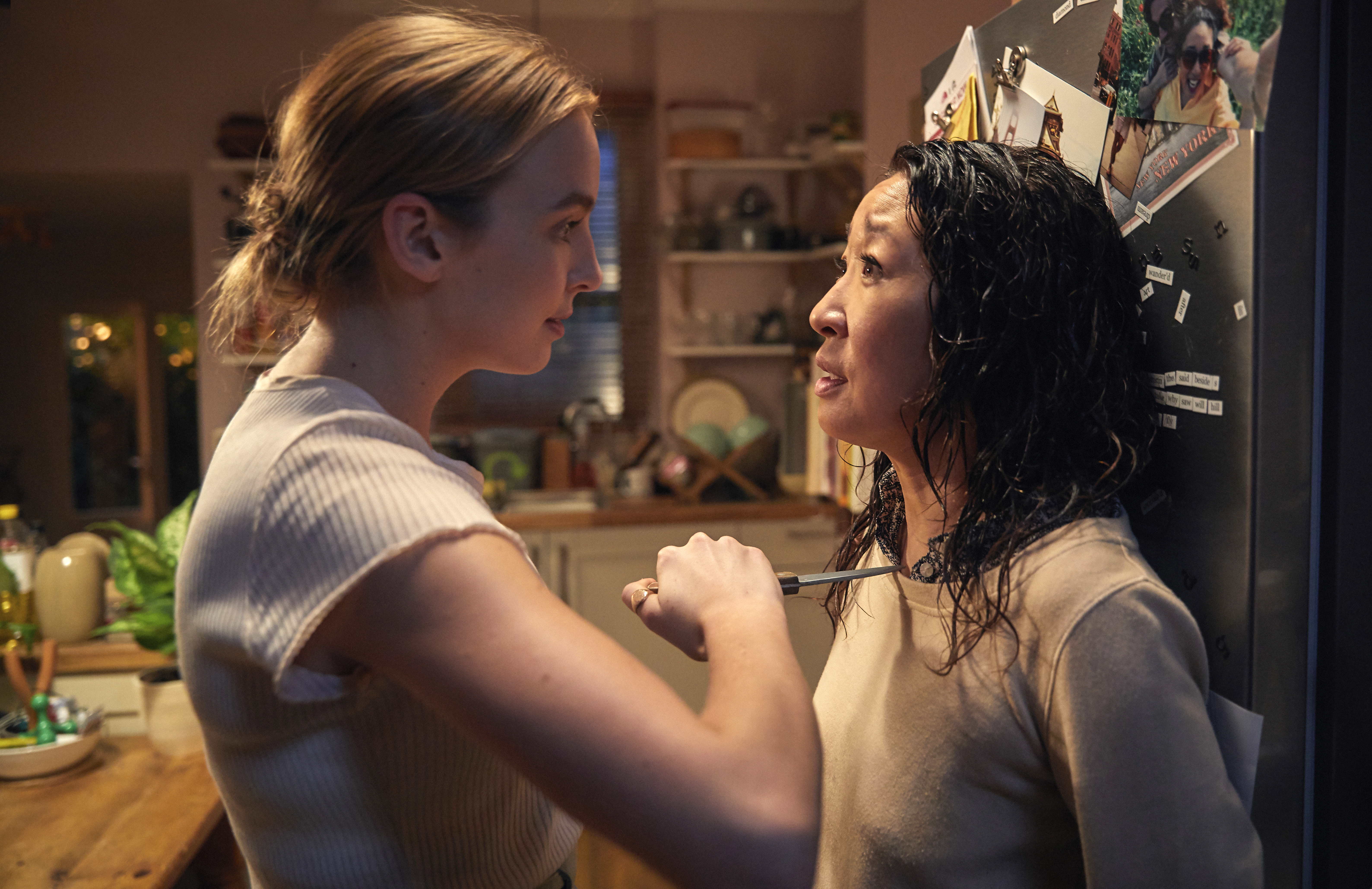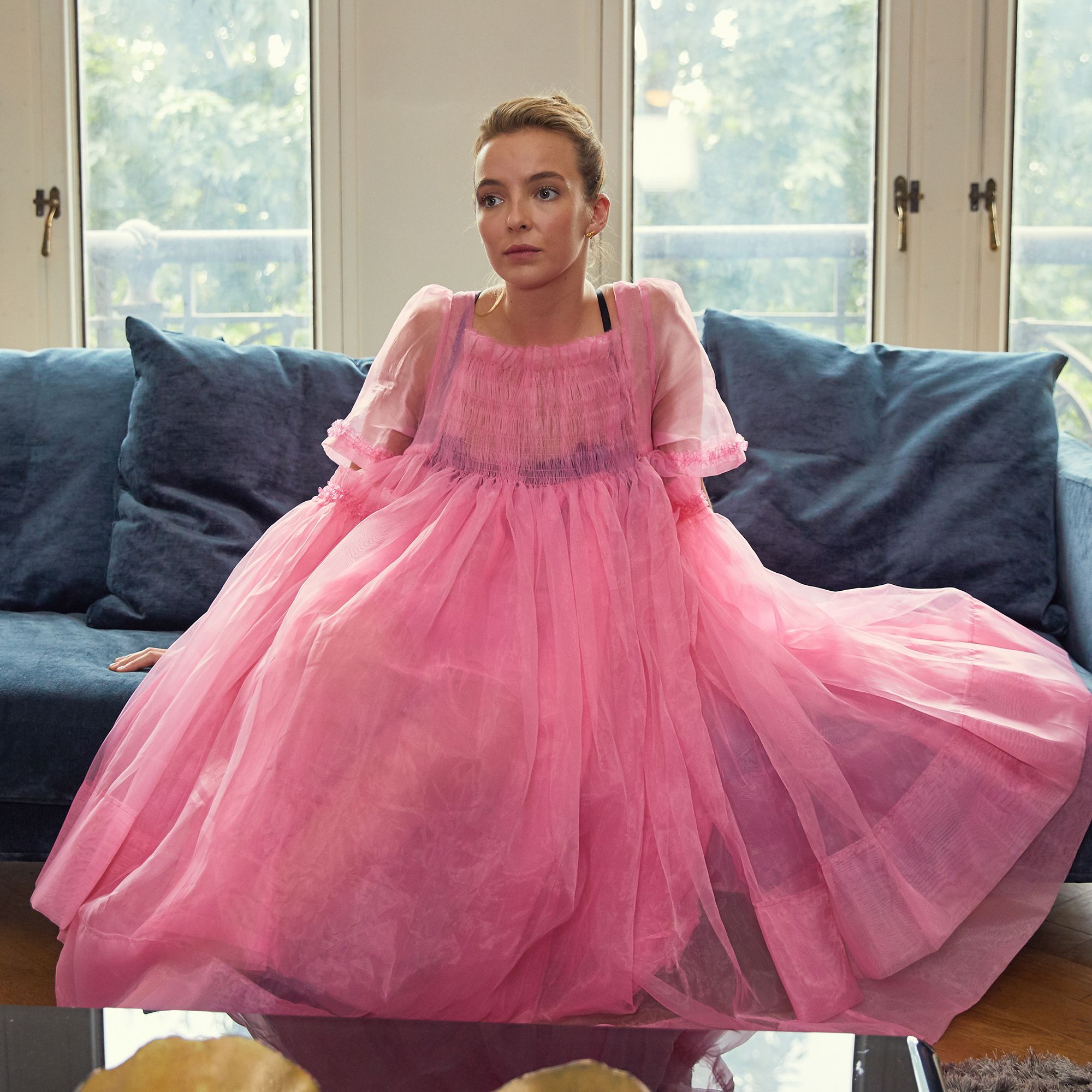Killing Eve's lethal femininity
Let's talk about hair, clothes, and murder


A free daily email with the biggest news stories of the day – and the best features from TheWeek.com
You are now subscribed
Your newsletter sign-up was successful
Spoiler warning: This article contains details about the fourth episode of Killing Eve.
People are raving about Killing Eve — BBC America's new thriller starring Sandra Oh and Jodie Comer — for good reason: It's special.
Yet in terms of plot, Phoebe Waller-Bridge's stylish series about an MI6 investigator tracking a serial killer is decidedly conventional. Thrillers like these are typically structured around a secret affinity between the investigator and the criminal, and that's the case here too. What's different about Killing Eve is that this central relationship — so often reserved for male detectives doggedly hunting male criminals — is expressed through femme self-presentation. Specifically, hair and clothes, and the way women use these to communicate or obfuscate. Or, indeed, to evaluate.
The Week
Escape your echo chamber. Get the facts behind the news, plus analysis from multiple perspectives.

Sign up for The Week's Free Newsletters
From our morning news briefing to a weekly Good News Newsletter, get the best of The Week delivered directly to your inbox.
From our morning news briefing to a weekly Good News Newsletter, get the best of The Week delivered directly to your inbox.
Take the suitcase trick from this week's episode. Villanelle, the empty-eyed killer played with glee and flair and occasional petulance by Comer, knows she's being investigated by MI6 agent Eve Polastri (Oh). Rather than flee the scene of her latest crime, she stakes out Eve (whose name she used for a prior assassination, and who has therefore come to Berlin to investigate) and steals her suitcase. Villanelle — whose love of textiles is intense enough that she interrogates her victims about designers before stabbing them in the eyes — goes through Eve's things with avid curiosity and is unimpressed by her nemesis' clothes. (Eve's tastes are simple bordering on comfortably ratty.) The intensity of Villanelle's psychic attraction to her enemy wanes at this revelation … until she finds a green scarf of which she approves. She puts that scarf on, and she's still wearing it when she murders Eve's ex-supervisor Bill (played by David Haig). Clothes are turning out to be oddly pivotal in this ongoing game of cat-and-mouse.
Villanelle's initial disappointment with the contents of Eve's suitcase is fascinating. That moment spins tension out of something television rarely uses well: the brutal private affinities created by personal taste. The show would collapse if Villanelle found Eve boring; that scarf literally saves it. Clothes tell Villanelle something crucial about Eve, and she uses that information. While Eve tries on dresses for an unwanted dinner with a Chinese source she's being forced to cultivate — and fails to find one that works — Villanelle, who's spying on her, surreptitiously hangs the perfect accessory outside her dressing-room: a belt. This is playful, pernicious caretaking.
I'll get back to the suitcase in a second, because something remarkable happens next. But it's worth stipulating here that Eve is clearly just as fascinated by Villanelle as Villanelle is with her. In an early interview with her soon-to-be-boss, Carolyn Martens of MI6 (the magnetic Fiona Shaw, with whom Eve is also rather taken), she describes herself as "just a fan" of the serial killer whose trajectory she's been tracking. "She doesn't have a signature, but she certainly has style," Eve says admiringly. And she refuses to condemn her. "Frankly, I don't give a s--t anymore," Eve exclaims. "She is outsmarting the smartest of us, and for that she deserves to do or kill whoever the hell she wants."
Now, some parts of that story beat will feel familiar, even tired. We've certainly seen these cat-and-mouse games build to a bizarre intimacy between cop and criminal before. That the two principals are women shouldn't change that basic equation that much.
A free daily email with the biggest news stories of the day – and the best features from TheWeek.com
But it does, because the medium through which Eve and Villanelle communicate is distinctly feminine.
Back to the suitcase. What happens after Eve's colleague Bill is murdered is that Eve — whose tendency to lose luggage is sufficiently well-established that her husband (Owen McDonnell) teases her about it — returns devastated to London. And gets her suitcase back. It's delivered to her home, filled with fabulously expensive clothes that are definitely not hers, but which are in her size. Bill is dead, and in the suitcase is a note from Villanelle apologizing — in luxury fabrics and, in the crowning touch, a perfume that bears her name: Villanelle. It's a tantalizing self-disclosure and an important refutation of Eve's early description to Carolyn. Villanelle does have a signature. And she's offered it to Eve, perhaps in hopes of being recognized.
This is pretty wild stuff — not because it's creepy, but because it's capturing something true and subterranean about how some women use clothes and cosmetics to communicate. I'm not sure I've ever seen that messy tangle of friendly, almost pheromonal antagonism portrayed with this much complexity. But Villanelle's mastery of a certain kind of femininity — right down to the ice-cream-eating Parisienne she pretends to be with poor Sebastian, her unfortunate suitor — is part of what makes this chess match riveting. Killing Eve is operating in a register that reminds me of the obscure relation writer Rosemary Hill calls "frock consciousness," and which she describes as involving "women and clothes and something that happens between them that we could think of as a kind of third rail of female experience."
The show is considering these slippages between appearance and vanity and self-fashioning. It's telling that Eve and Villanelle meet while Eve is absent-mindedly messing with her hair in the mirror, and that Villanelle's first words to her are cosmetic: "Wear it down."
As for Villanelle, she specializes in a very particular kind of semi-ironized femme theatricality. Here, for example, is the pink dress she dons for a meeting with her handlers, who suspect she's lost her cold-blooded edge:

Spoiler alert: She hasn't. "Any anxieties or stress lately?" they ask her. "I had quite a heavy period last week, but other than that, I'm okay," she replies, and to call her delivery of that line "deadpan" would be misleading. It could almost be sincere. Comer's brilliance is that she gives nothing way. But she is playing around on planes that aren't always quite visible to the men questioning her.
As is Killing Eve. I was struck, watching the pilot, at how remarkable it was to see Villanelle unzip herself from the inside of a suitcase in which she'd been hiding. So often, in thrillers like these, that suitcase would contain a dead woman — someone bent and broken to whom horrible things were done. Typically, it falls to the male detectives to figure out what happened.
Instead, Villanelle unzips herself, finds out who made the silk bedspread she likes, kills the "Godfather" figure shows like these are so often about, and becomes — so literally that it takes one's breath away — Eve's baggage.
Lili Loofbourow is the culture critic at TheWeek.com. She's also a special correspondent for the Los Angeles Review of Books and an editor for Beyond Criticism, a Bloomsbury Academic series dedicated to formally experimental criticism. Her writing has appeared in a variety of venues including The Guardian, Salon, The New York Times Magazine, The New Republic, and Slate.
-
 The Week Unwrapped: Do the Freemasons have too much sway in the police force?
The Week Unwrapped: Do the Freemasons have too much sway in the police force?Podcast Plus, what does the growing popularity of prediction markets mean for the future? And why are UK film and TV workers struggling?
-
 Properties of the week: pretty thatched cottages
Properties of the week: pretty thatched cottagesThe Week Recommends Featuring homes in West Sussex, Dorset and Suffolk
-
 The week’s best photos
The week’s best photosIn Pictures An explosive meal, a carnival of joy, and more
-
 Walter Isaacson's 'Elon Musk' can 'scarcely contain its subject'
Walter Isaacson's 'Elon Musk' can 'scarcely contain its subject'The latest biography on the elusive tech mogul is causing a stir among critics
-
 Welcome to the new TheWeek.com!
Welcome to the new TheWeek.com!The Explainer Please allow us to reintroduce ourselves
-
 The Oscars finale was a heartless disaster
The Oscars finale was a heartless disasterThe Explainer A calculated attempt at emotional manipulation goes very wrong
-
 Most awkward awards show ever?
Most awkward awards show ever?The Explainer The best, worst, and most shocking moments from a chaotic Golden Globes
-
 The possible silver lining to the Warner Bros. deal
The possible silver lining to the Warner Bros. dealThe Explainer Could what's terrible for theaters be good for creators?
-
 Jeffrey Wright is the new 'narrator voice'
Jeffrey Wright is the new 'narrator voice'The Explainer Move over, Sam Elliott and Morgan Freeman
-
 This week's literary events are the biggest award shows of 2020
This week's literary events are the biggest award shows of 2020feature So long, Oscar. Hello, Booker.
-
 What She Dies Tomorrow can teach us about our unshakable obsession with mortality
What She Dies Tomorrow can teach us about our unshakable obsession with mortalityThe Explainer This film isn't about the pandemic. But it can help viewers confront their fears about death.
